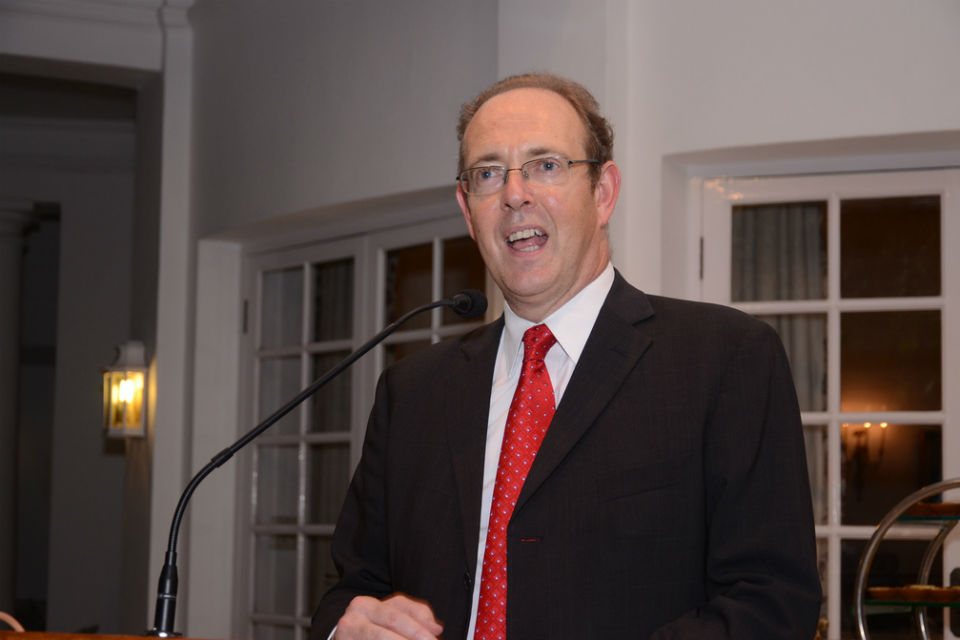'Why diplomats are like journalists'
Transcript of a speech at annual media lunch, in New Delhi, Friday 13 December 2014 by Sir James Bevan KCMG, British High Commissioner to India.

[Ladies and gentlemen, friends and colleagues, distinguished guests]
The first thing they tell you on the Foreign Office media training course is that there is no such thing as off the record. This is definitely true, especially in India. But at least Indian journalists do us the courtesy, when they write about something which was meant to be off the record, of telling their readers that it was off the record. It’s important that your readers understand what they are and are not supposed to know.
The second thing they tell you is to always put the media bus in the middle of the Prime Minister’s convoy, because if the media get left behind they get mad and they write even worse stories about you than usual. I hope you won’t get mad with us today. If there is anything wrong with the food or drink, please complain to Marcus.
And the third thing they tell you on the Foreign Office media course is to always be friendly to journalists, because they have a tough life and most people dislike journalists almost as much as they dislike diplomats. So I am delighted to be able to welcome you fellow sufferers – Indian, British and international media - to my Residence for our annual media lunch.
People think that being a diplomat is glamorous, and that being a journalist is glamorous too. Wrong, as we all know. The British writer G.K. Chesterton knew that too. He observed: “Journalism largely consists in saying “Lord Jones is dead” to people who never knew Lord Jones was alive.”
Nor, I fear, are you in the media any more popular with commentators than those of us in diplomacy. Indeed when I was preparing for this speech I was surprised – and a bit shocked – to find that most sayings about your craft are not complimentary.
Oscar Wilde thought that journalism was a good thing, but only because: “By giving us the opinions of the uneducated, journalism keeps us in touch with the ignorance of the community.”
Norman Mailer was even more brutal: “If a person is not talented enough to be a novelist, not smart enough to be a lawyer, and his hands are too shaky to perform operations, he becomes a journalist. “
Humbert Wolfe, the early 20th c British writer, is remembered today primarily for producing this little verse:
“You cannot hope to bribe or twist, thank God!/The British journalist/But seeing what the man will do/unbribed, there’s no occasion to”. We even find this deplorable view of the media in one of the UK’s greatest cultural exports, Yes Minister – which you Indians and we Brits both know is not in fact a comedy but a documentary.
In one scene Sir Humphrey, the devious Permanent Secretary, is instructing the Minister’s young private secretary Bernard on procedure. Sir Humphrey says: “Bernard, always remember that as a matter of principle, Ministers should never know more than they need to know. “Why is that?” asks the innocent Bernard. “Well”, says Sir Humphrey, “Ministers are like secret agents. They might be captured and tortured”. ‘By terrorists?’ asks Bernard. “No”, says Sir Humphrey, ‘By the BBC.”
And Karl Kraus, the Austrian writer, went so far as to offer this definition of a journalist: “a person without any ideas but with a great ability to express them”. He added a second definition later: “a writer whose skill is improved by a deadline: the more time he has, the worse he writes”.
I don’t buy this. I like and respect most journalists. And though the relationship between us diplomats and you media folk is occasionally adversarial, we actually have a lot in common. We are both interested in the truth. We are both trained not to believe everything we hear. We both want – perhaps even without admitting it - to make the world a better place.
But there is one area I have noticed where you media types and we diplomats do have a different approach. And that is in how we say things. As a general and wholly unfair rule, the broadcast media and print journalism tend to simplify and overstate things, while diplomats tend to complicate and understate them.
The Brits are naturally understated anyway, and when you combine being British with the natural understatement of diplomats, you get a kind of understatement squared. In fact in the British diplomatic service we are actually trained to understate things. I was told on my very first day in the Foreign Office, well over 30 years ago now, that in expressing yourself you should never shout, you should never be emotional, and above all you should always be understated in what you said. They gave us an example to illustrate this principle.
If you were the British Ambassador in Moscow (this was during the Cold War) and you were called into the Kremlin to be told that Russia had just launched nuclear missiles at Britain, then what you should do was this. You should draw yourself up to your full height and say: “This is a matter to which Her Majesty’s Government cannot remain indifferent.”
So, ladies and gentlemen, without shouting, emotion or overstatement, I just want to say how pleased we are to have you all here with us, how much we have enjoyed working with you over the last year, and to wish all of you a happy and successful 2014.